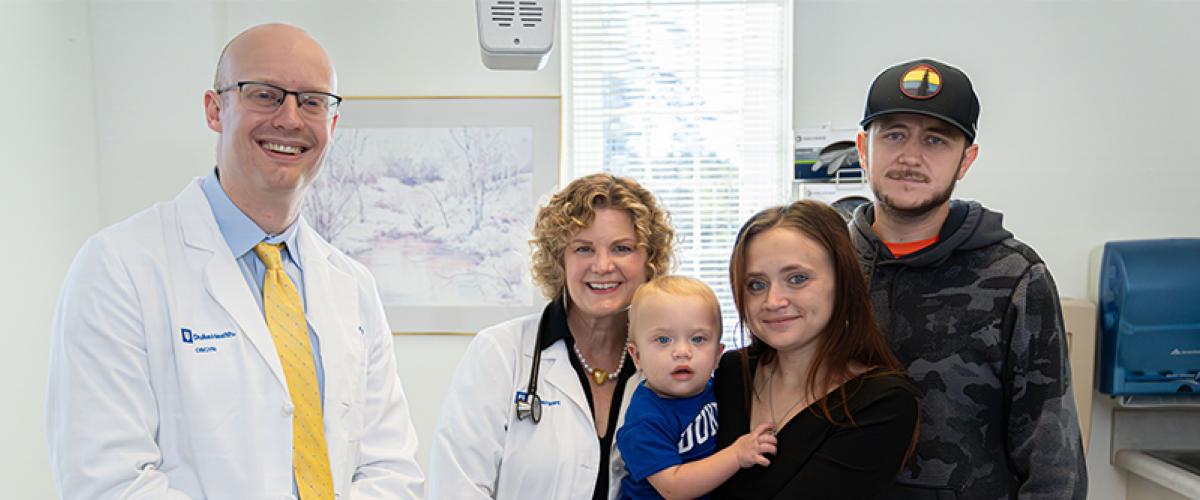
Making Pregnancy Safer: Inside the Effort to Reduce Maternal Mortality
By Mary-Russell Roberson
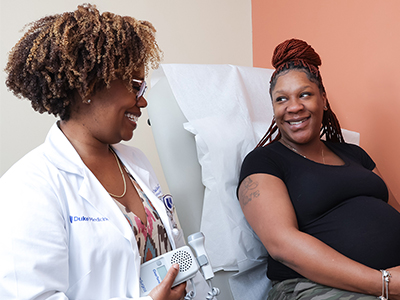
In the U.S., giving birth is more dangerous than in other wealthy nations. Much more dangerous. “Despite being highly industrialized and having advanced medical care available, we have the highest rate of maternal mortality of any developed nation,” said Brenna Hughes, MD, MSc, vice chair for quality and safety and division chief of Maternal-Fetal Medicine at Duke.

“We also see that the maternal mortality rate is multifold higher in Black women than white women.” What’s worse, maternal rates for all racial and ethnic groups in the U.S. are rising.

There have been ups and downs, with a significant uptick during the COVID-19 pandemic, but overall, “it’s been going up for decades,” according to maternal-fetal medicine specialist Jerome “Jeff” Federspiel, MD, PhD (Maternal-Fetal Medicine Fellowship Class of 2022).
Duke's Pregnancy Heart Center ensures safer pregnancies for women with a history of pre-existing cardiovascular disease or congenital heart disease, as well as those who develop cardiovascular problems during pregnancy.
A multidisciplinary clinic cares for patients who need specialized care to stay healthy and safe during pregnancy, delivery and postpartum. During monthly meetings, team members develop care plans for each patient.
Patients include women with congenital heart defects or mechanical heart valves who may have been told in the past that they’d never be able to have children. The team also cares for women with serious pre-existing heart disease like heart failure or previous heart attacks. And many of the center’s patients have conditions that began in pregnancy, such as gestational diabetes or hypertension.
“Universal health care would potentially decrease [maternal mortality] a lot. People have higher mortality in pregnancy when they come into pregnancy with worse underlying health disorders. There is a misconception that people who are pregnant are young and healthy, but many are not healthy. Really focusing on preventative health care as a nation would probably be the most important thing we could do." — Dr. Brenna Hughes
Duke Ob/Gyn Perinatal Quality Collaborative of North Carolina (PQCNC) Sepsis Project

“Duke participates in the Perinatal Quality Collaborative of North Carolina (PQCNC). This partnership with PQCNC and the other participating hospital sites throughout North Carolina supports the development and implementation of evidence-based measures to prevent, rapidly identify and treat conditions that contribute to the morbidity and mortality of the birthing population,” said Heather Talley, MSN, CPPS, RNC-OB, C-EFM, CNML, Administrative Director of Quality & Safety, Women’s Services for Duke University Health System.
“Our physicians, nurses and care leaders work as expert team members who help to shape the PQCNC initiatives and their goals and as hospital-based team members who implement these changes within the patient care space. This partnership builds on the work already in place and validates the improvements through the review of outcomes measures. Duke is committed to creating systems that help to make pregnancy safer for all pregnant patients and to sharing best practices that can support safer birthing experiences for women throughout North Carolina.”
SMART AIMS:
- Improve identification and prompt treatment to improve sepsis care and outcomes.
- Implement a screening tool and patient education for pregnant and postpartum patients.
- Administer appropriate antibiotics within one hour.
- Implement escalation of care protocol.
- Review of all sepsis cases to improve care and reduce bias.
MEASUREMENT STRATEGY: 100% OF...
- Patients screened for sepsis
- Patients who screen high-risk receive appropriate and timely follow-up
- Patients receive education about Urgent Postpartum Warning Signs
- Maternal sepsis cases receive multidisciplinary case review
- Maternal sepsis cases are followed by a Patient Event Debrief with the patient
Duke’s Placenta Accreta Program Makes the Birth Experience Unique for PAS Patients
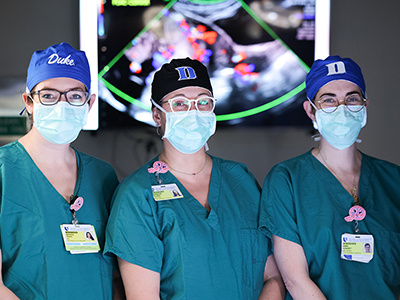
Maternal-fetal medicine specialist Jennifer Gilner, MD, PhD (Residency Class of 2013; Maternal-Fetal Medicine Fellowship Class of 2016) has dedicated her career to caring for patients with complicated pregnancies, and during her years at Duke, has honed particular expertise in one of the most dangerous conditions of pregnancy: the Placenta Accreta Spectrum (PAS). Inspired by innovative PAS care approaches conceived by Duke’s Gynecologic Oncology Division in the early 2000s-2010s, Dr. Gilner built on this foundation to develop one of the few maternal- fetal medicine-driven full-spectrum PAS care programs in the nation.
Full-spectrum PAS care requires patient risk-factor recognition, targeted ultrasound-based diagnostics, multiteam delivery coordination, unique surgical skills, post-surgical follow up and continuous patient support during and after the pregnancy. Dr. Gilner and partners Anne West Honart, MD, MPhil (Duke faculty since 2021), and Amanda Craig, MD (Maternal-Fetal Medicine Fellowship Class of 2022), have refined their PAS surgical approach to achieve patient outcomes significantly improved over national averages.
Nurse navigator Dana McComb, BSN, RN, ensures there is continuity, support and direct connection for patients from the time of PAS diagnosis through postpartum recovery. Collaboration and continuous care integration with the Duke Fetal Diagnostic Center (ultrasound unit), Duke Women’s Anesthesiology, Duke Interventional Radiology and Duke Neonatology provide a comprehensive model for patients experiencing this fearsome pregnancy complication.
While the exact cause of PAS remains incompletely understood, what currently is known is that in affected pregnancies, the developing placenta forms an abnormal and dangerous connection to the muscle of the uterus — usually in patients with prior cesarean delivery or other prior ob/gyn surgical procedures. The rapidly growing placenta can disrupt the normal shape and integrity of the uterus, and it remodels the blood vessel supply, introducing the risk of life-threatening blood loss at the time of labor and/or delivery.
“The rate of PAS is rising in the U.S., and the threat to pregnant people and their babies remains high, in part because many cases are not recognized until delivery — when dangerous bleeding has already started.” — Dr. Jennifer Gilner, who serves as medical director of the Duke Birthing Center.
For more severe forms of PAS, the most common and safely proven therapy is to undergo hysterectomy at the time of the baby’s delivery. With the distorted anatomy from abnormal placental location and massive blood flow to the pregnant uterus, this surgery can be extremely morbid in inexperienced hands or in hospitals with inadequate blood transfusion or ICU resources, Dr. Gilner notes.
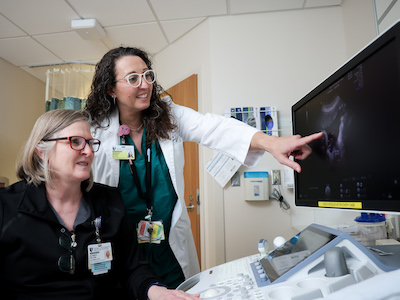
Timely referral to a high-volume center with appropriate expertise in diagnosis and planning, and a well-developed care program, are strongly tied to reduced blood loss, reduced organ injury, lower risk of intensive care unit admission and overall safer pregnancy journey for patients — and the Duke PAS Care Program is a leading example of this concept, according to Dr. Gilner.
In the recently published Clinical Expert Series: Placenta Accreta (Obstetrics & Gynecology, July 2023), guidance about PAS prediction and goals for future research are identified.
In the North Carolina area and surrounding region, referral to the Duke Placenta Accreta Care Program at or before 26 weeks gestation is recommended. Duke_PAS@duke.edu
The Future of AI

Ensuring that the next generation of high-risk pregnancy specialists are on the cutting edge in an ever-changing care model is something Dr. Gilner prioritizes. Her goal is to find new and more effective ways to approach the complexities of PAS. Under Dr. Gilner’s mentorship, Maternal-Fetal Medicine Fellowship alumnus Luke Gatta, MD (Class of 2023), conducted a study focusing on the validation of the International Society of Ultrasound in Obstetrics and Gynecology (ISUOG) consensus for reporting PAS, which is endorsed by the Society for Maternal-Fetal Medicine (SMFM). Validation of the ISUOG consensus checklist to see if it can distinguish PAS detected in the operating room, and utilization of AI for prediction models, are currently being evaluated at Duke.
In 2022, Drs. Gatta and Gilner, along with maternal-fetal medicine specialists Sarah Ellestad, MD; Brita Boyd, MD; and Anthony Swartz, BS, RT(R), RDMS, were awarded a Duke Artificial Intelligence SPARK Award for the proposal titled “LAIPPAS (Leveraging Artificial Intelligence to Predict Placenta Accreta Spectrum),” which will forge collaboration with the Duke Center for AI in Radiology.
Duke Institute for Health Innovation (DIHI) Maternal Early Warning System: DMEWS
The Duke Division of Maternal-Fetal Medicine and Duke Birthing Center nursing leadership have collaborated with DIHI to develop tools that can identify patients at risk of serious pregnancy complications such as hemorrhage and sepsis before they happen. Next year, the DMEWS will start testing machine learning models in clinical workflows to predict hemorrhage and sepsis. Prominent features for postpartum hemorrhage include the key analytes (e.g., platelets), information extracted from prenatal ultrasounds (e.g., estimated fetal weight, placental abnormalities, amount of amniotic fluid) and comorbidities (e.g., prior hemorrhage, history of in vitro fertilization).
The advancements in DMEWS represent a milestone in ongoing efforts to improve the quality of maternal health care. This is achieved by leveraging state-of-the-art machine learning and large language techniques. DMEWS improves the well-being of mothers and infants and strengthens Duke‘s position as a leader in health care innovation.
The DMEWS team’s work compares its hemorrhage model to the Association of Women’s Health, Obstetric and Neonatal Nurses’ (AWHONN) model in Duke’s instance of Epic©. Its models extract real-time data. As such, they require much less data entry and provide more complete data than traditional screening tools. Particularly, the DMEWS extracts features from ultrasounds, notes, analytes and flowsheets from prior encounters, allowing the model to make informed predictions about baseline risk before intrapartum data is even entered.
The DMEWS is kicking off a sequence of rigorous data, prediction, user interface and workflow validation with maternal-fetal medicine physicians and leaders. In brief, these efforts ensure that this solution clearly and consistently presents the clinicians with the right data about the right patient at the right time.
Duke High-Risk Pregnancy Experts Help Heart Transplant Recipient Have a Safe Pregnancy and Healthy Baby
By Esther L. Ellis
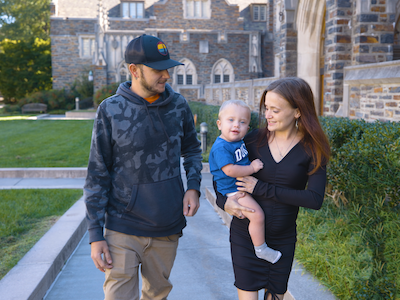
Brianna Ellington had a stroke on her 18th birthday, only months after the birth of her second child. Three months later she had a heart transplant at Duke University Hospital. When she discovered she was pregnant with her third child, Ellington turned to the high-risk pregnancy experts at Duke Health for help. They worked with Ellington throughout her pregnancy to ensure she and her baby were safe. “They were there for every move,” Ellington said. “They made me feel confident in myself.”
An Unwelcomed Birthday Surprise
Ellington’s stroke was a complete shock because she appeared to be in good health — she’d recently given birth to her second child and nothing seemed unusual. After extensive tests, doctors determined that Ellington’s heart muscles had weakened so badly during her second pregnancy that she needed a new heart as soon as possible. She underwent a heart transplant at Duke University Hospital after being bedridden in the hospital for three months.
Pregnancy After Heart Transplant
When Ellington found out she was pregnant with her third child three years later, she worried about the possible complications and sought help at the Duke Pregnancy Heart Center. Maternal-fetal medicine specialist Jerome “Jeff” Federspiel, MD, PhD, explained the risks. “We talk about what is it like to be pregnant when you’ve had a stroke, when you’ve had heart failure, and a heart transplant,” said Dr. Federspiel.
Heart transplant recipients are at high risk for heart complications during pregnancy. Ellington’s history of stroke made the risk of birth complications for her and her baby even higher. Dr. Federspiel assured Ellington that whether or not she moved forward with the pregnancy, she would have support. “He told me he was going to be by my side the whole way,” she said. “He made me feel really safe when I was scared.”
Receiving care at the Duke Pregnancy Heart Center meant Ellington had a team of specialists trained in highrisk obstetrics, cardiology and anesthesiology working together to support her. “The Pregnancy Heart Center allows us to see high-risk women with heart conditions in one place, to care for them,” said cardiologist Cary Ward, MD. Throughout her pregnancy, Ellington routinely met with specialists who adjusted her medications, answered her questions and monitored her and her unborn baby.
Complications Lead to an Early Delivery
At 33 weeks pregnant, Ellington was admitted to Duke University Hospital with preeclampsia, a condition characterized by dangerously high blood pressure. A week later, doctors delivered her baby, Landon, by cesarean section after monitoring detected he was in distress. “The scariest part of the whole pregnancy was the delivery,” said Ellington. Following his birth, Landon was transferred to Duke Regional Hospital where he spent a week in the neonatal intensive care unit (NICU). Ellington was healthy enough to go home within days of her delivery.
Happy and Healthy a Year Later
More than a year later, Ellington and her son are happy and healthy, and Ellington said she is grateful she had a resource like the Duke Pregnancy Heart Center. “What I would say to another woman experiencing what I went through is to not to give up and to trust Duke,” said Ellington. “Duke really took care of me.”
Ensuring Safe Discharge: Ob/Gyn Team Wins Kirkland Award at Duke Health Quality and Safety Conference
Hypertensive disorders of pregnancy (HDP) are the second leading cause of maternal mortality in the U.S. and are a major contributor to postpartum deaths. Current recommendations are for clinical follow up with assessment of blood pressure within three days after discharge for severe HDP, and no later than seven to 10 days after delivery for all patients with HDP; however, at Duke, this was only occurring 40% of the time.
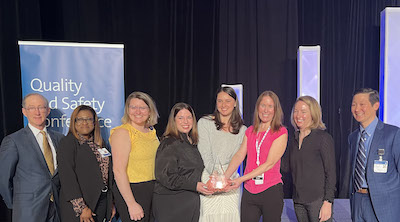
As part of Duke’s commitment to reduce maternal morbidity by 50% in five years and work toward eliminating disparities, a team of interdisciplinary collaborators from the Duke University Health System, led by Kathleen Zacherl, MD (Quality and Safety in Women’s Health Fellowship Class of 2023), implemented a multi-pronged set of interventions. The goal was to increase the percentage of postpartum follow-up blood pressure checks from 40% to 70% in patients with HDP at Duke University Hospital within nine months. Interventions implemented to date include standardizing education, developing tip sheets, implementing new SmartPhrases, standardizing visit types, emphasizing telehealth over in-person visits and ensuring education is available in multiple languages. Thus far, the results have been remarkable, with the rate of completed visits for blood pressure checks within seven days of discharge increased to 66% — just shy of their goal. The project was the recipient of the Rebecca Kirkland Award at the 2023 Duke Health Quality and Safety Conference.
Exciting future interventions that the team is working on include direct scheduling by obstetrics unit staff and remote blood pressure monitoring using an innovative patient platform, which has been implemented at Duke University Hospital and is being trialed at Duke Regional Hospital.
"I didn’t know you could get postpartum preeclampsia, and this is my third child." — Duke Health patient interviewed as part of the HDP project
The Alliance for Innovation in Maternal Health (AIM), which is led by ACOG, revised its maternal safety bundle on severe hypertension in pregnancy to state that those patients with severe HDP should have a postpartum blood pressure check within three days of birth hospitalization discharge.
Important Facts
- More than half of pregnancy-related deaths occur postpartum.
- Rates of successful short-interval blood pressure checks are 30-50% nationally.
- Patients with hypertension are particularly at risk, with hypertension being one of the leading causes of death in the first week after delivery.
- Reports of using telehealth and remote blood pressure monitoring have been highly successful in improving patient access to care, with studies showing visit completion reaching 90%.
- Duke has successfully implemented the first phase of its HDP program, through which patients identified with HDP are discharged from Duke University Hospital with a blood pressure machine for continuity of care and monitoring. A pilot is now underway for expansion at Duke Regional Hospital.
Supporting Mental Health in Patients with High-Risk Pregnancies
By Susan Gallagher, Duke Department of Psychiatry and Behavioral Sciences

Delivering comprehensive behavioral health care for patients with high-risk pregnancies is crucial throughout the perinatal and postpartum periods. To support this need, an interdisciplinary team of clinicians comprised of psychiatrists, psychologists, maternal-fetal medicine specialists and a family medicine social worker are partnering to ensure treatment for psychiatric concerns are addressed cohesively.
This collaboration between the Duke Departments of Psychiatry and Behavioral Sciences and Obstetrics and Gynecology has been critical, “because particularly in pregnancy and postpartum, treatment for psychiatric concerns can’t wait. Sometimes we need to make sure we’re acting now to care for Mom in order to support a good outcome for delivery or promote a healthy attachment with baby,” notes Julia Tarr, MSW, LCSW.

Tarr supports three Duke Perinatal high-risk obstetrics clinics. Patients are referred to the clinics from other Duke obstetrics practices, the Durham County Health Department and other ob/gyn practices across North Carolina. The only outpatient behavioral health clinician embedded in Duke Ob/Gyn, Tarr works on-site in the Durham high-risk obstetrics clinic, where she can get a “warm hand-off” to a patient from a provider who has identified a behavioral health concern in that patient.

Tarr works collaboratively with colleague Bernadette Vereen, MSW, LCSW-A. Vereen triages and schedules patients requiring medication management or therapy, as well as meeting with patients to share resources such as the Special Supplemental Nutrition Program for Women, Infants and Children (WIC), diaper trains, places that provide baby clothing and support groups. She also sees a few patients each week for psychotherapy. Vereen noted:
"It’s really important to me to ensure a good fit between patient and provider, and also to just be a welcoming voice, because a lot of the patients have faced so much adversity, and it’s a very scary period. It’s nice to be that person who can assure them, ‘You’re here, you’re safe and we just want to support you — whatever that looks like for you.’” — Bernadette Vereen, MSW, LCSW-A

Sarah Dotters-Katz, MD, MMPHE, a maternal-fetal medicine specialist, underscores the complex needs of the patients the team cares for. “Many of our patients have underlying social risk factors, such as poor access to care, housing and food insecurity, or substance use disorders, that complicate how we care for them and their pregnancies,” she explained.
While managing their day-to-day demands, Tarr and Vereen also try to focus on building referral systems and partnerships that will help them provide the best, most seamless care to their patients at Duke as well as in the patients’ home communities. They also meet regularly with a broader team of clinicians and trainees for educational seminars, case consults and long-term planning for addressing perinatal behavioral health needs both within the high-risk obstetrics clinics and across the Duke University Health System.